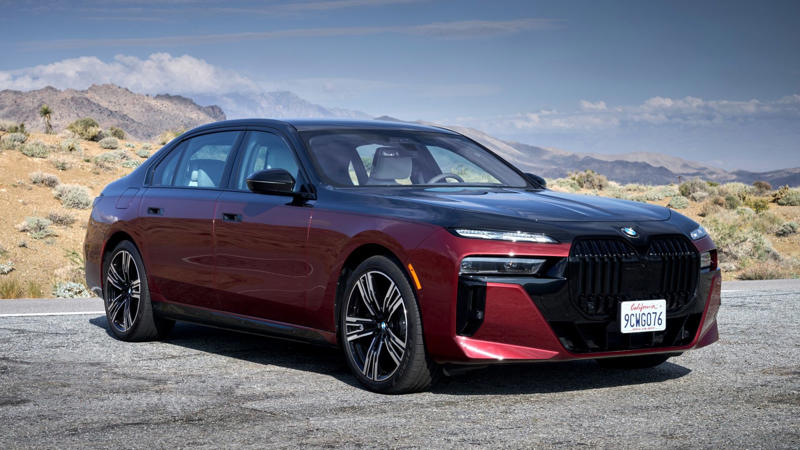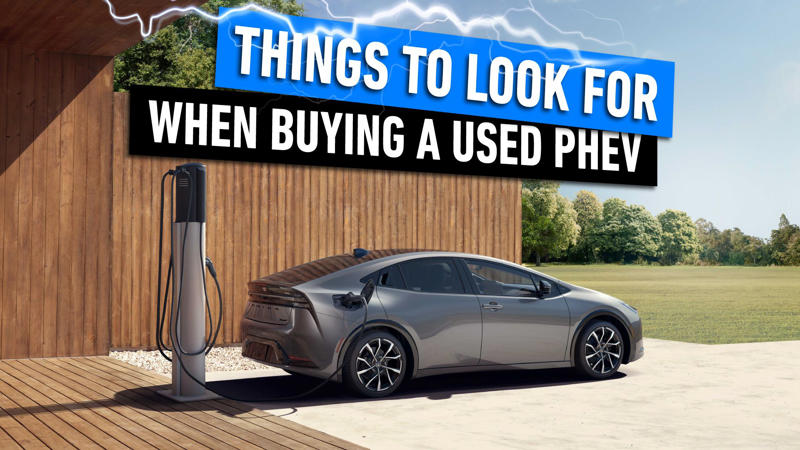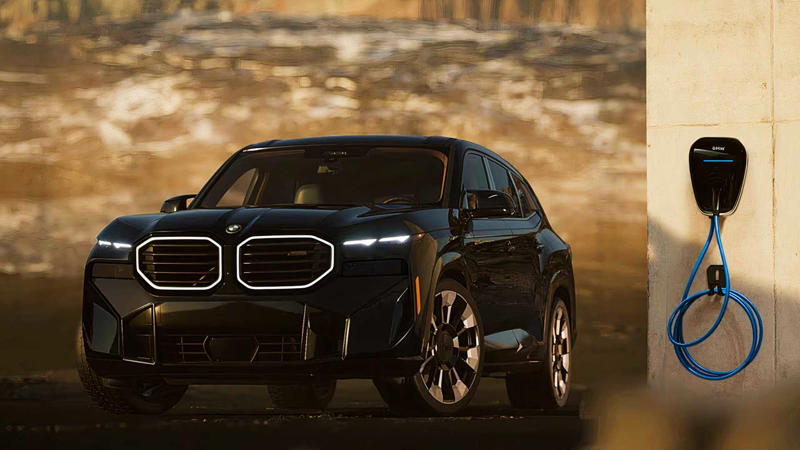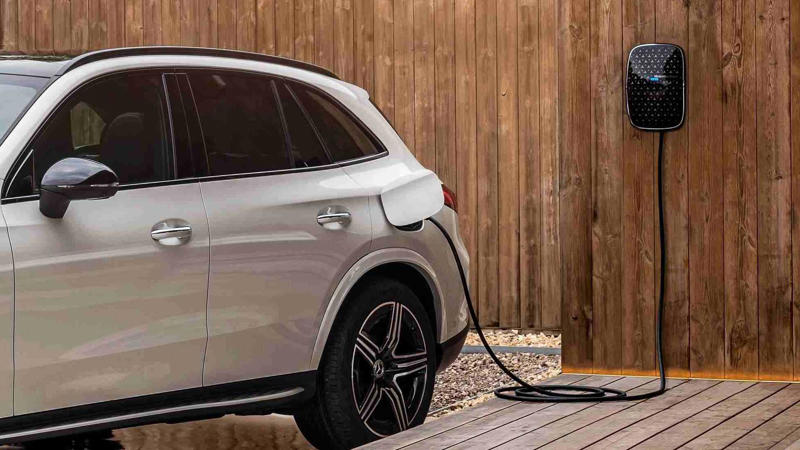Here's How Much It Really Costs To Charge A PHEV At Home In 2025
The prospect of owning a plug-in hybrid car has become increasingly compelling as EVs become more expensive and battery technology improves. Modern PHEVs place a bit less of a reliance on the engine, making them substantially more efficient options. Gasoline prices also continue to surge, making vehicle ownership an even more expensive experience. PHEVs benefit from lower running costs, despite featuring an engine that requires servicing, but they remain a more cost-effective option. Interestingly, a lot of consumers remain totally unaware of how much cheaper it is to charge a PHEV when compared to a conventional ICE, even if you use the more preferable Level Two 240-volt fast charging wallbox, available from most manufacturers and credible suppliers.
The Range Rover PHEV currently features one of the largest battery packs, measuring an impressive 38.2 kWh. More affordable options feature packs with about half the capacity of this. Electricity costs vary from state to state, so not everyone will have the same running costs, but it is almost a certainty that everyone will be paying less than what they would for gasoline. Of course, you do have to put up with the higher purchase price and insurance costs, but this feature emphasizes the charging costs alone.
In order to give you the most up-to-date and accurate information possible, the data used to compile this article was sourced from various manufacturer websites and other authoritative sources, including the EPA and Kelly Blue Book.
Understanding Home PHEV Charging Costs In 2025
Breaking Down The Factors Influencing Your Electricity Bill

Mazda CX-90 PHEV advanced safety feature
The cost of charging a plug-in hybrid electric vehicle at home in the United States as of 2025 varies depending on electricity rates, vehicle efficiency, and driving habits. The average residential electricity rate is approximately 16.94 cents per kWh, but this can differ significantly across states. PHEV efficiency when running on electrical power only, which is measured in miles per kWh, determines how far a vehicle can travel per unit of electricity. The most efficient PHEVs typically achieve around 26 kWh per 100 miles, while less efficient models may only reach 73 kWh per 100 miles.
Key Factors Affecting EV Charging Costs:
- Electricity rates vary by region, significantly influencing the cost per kWh.
- EV efficiency determines how much electricity is required per mile.
- Driving distance directly affects monthly charging needs and expenses.
- State policies can lead to wide variations in electricity costs.
- Efficient EVs reduce charging expenses due to their higher miles per kWh.
- Simple formulas help drivers estimate costs based on their habits and vehicle performance.
Additionally, monthly driving distance has a direct impact on overall charging expenses. Drivers can calculate their charging costs by dividing their mileage by the vehicle's energy consumption, which they then multiply by the cost of electricity. If a driver travels 1,000 miles per month in an EV with three miles per kWh efficiency and pays 16.94 cents per kWh, the charging cost would be about $56.47.

2024 BMW 7 Series Front TQ
5 PHEVs That Are Worth Every Penny (And 5 Fair Alternatives)
PHEVs have expanded to be offered in several models. Here are ten PHEVs to consider, five that are worth the price, and five great alternatives.
Electricity Rates Across The United States
How Your Location Impacts Charging Expenses

Audi
The cost of charging an EV at home in the United States is directly influenced by regional electricity rates, which vary widely across the country. Electricity is more expensive in some states due to factors like higher energy demand, reliance on costly energy sources, and the need for extensive infrastructure maintenance.
States like California face additional challenges, including renewable energy investments, grid modernization, and regulatory costs. Geographic conditions, such as limited local energy production or extreme weather, can further drive up costs. Ultimately, state-specific policies, market dynamics, and energy consumption patterns play a significant role in shaping electricity prices.
Key Factors Influencing PHEV Charging Costs
- There are significant state-by-state variations in electricity rates that will affect your charging costs.
- Better efficiency measured in miles per kWh means more miles per unit of electricity.
- Good driving habits increase the total monthly miles driven, directly impacting overall charging expenses.
- Some utilities offer lower rates during off-peak hours, potentially reducing costs.
- The efficiency of home charging stations can influence electricity consumption.
- Certain states provide incentives or rebates that can offset electricity costs for plug-in hybrid and EV owners.
Average Residential Electricity Rates by State
State | Rate (¢/kWh) |
California | 30.22 |
Connecticut | 29.96 |
Massachusetts | 29.23 |
Alaska | 25.52 |
Delaware | 17.93 |
Arizona | 15.02 |
Texas | 14.17 |
Florida | 13.25 |
Arkansas | 11.88 |
Utah | 11.42 |
The national average residential electricity rate as of the beginning of 2025 is approximately 16.94 cents per kWh, but state-specific rates can differ markedly. For instance, California residents face higher electricity costs, averaging 30.22 cents per kWh, which is concerning when you consider this state's insistence on phasing gasoline out by 2035. This makes EV charging, in general, more expensive compared to states like Utah, where the rate is 11.42 cents per kWh.
To estimate monthly charging expenses, consider an EV with an efficiency of three miles per kWh. In California, driving 1,000 miles would require approximately 333 kWh, resulting in a cost of about $100.63. In contrast, the same usage in Utah would cost approximately $38.04.

Things-To-Look-For-When-Buying-A-Used-Plug-in-Hybrid-Vehicle
10 Things To Look For When Buying A Used Plug-in Hybrid Vehicle
PHEVs have become more and more popular in recent years. Here's what you need to know about buying a used one.
EV Efficiency And Its Impact On Charging Costs
Why Your Vehicle's Efficiency Matters

BMW
The efficiency of your electric vehicle plays a crucial role in determining how much it costs to charge. This is because the more efficient an PHEV is, the less electricity it consumes to travel a certain distance. For example, while the aforementioned Range Rover P550 PHEV features a much larger battery pack, the EPA indicates that it will consume 63 kWh per 100 miles. The Toyota RAV4 Prime's battery pack is about half the size, but it consumes a much more attractive 36 kWh per 100 miles thanks to its lower power output and curb weight. In the PHEV world, manufacturers typically fit more powerful and larger models with larger battery packs.
Key Aspects Of PHEV Efficiency
- Higher efficiency means fewer kWh are needed to travel the same distance using electrical power only, leading to lower charging costs.
- PHEV model choices can vary greatly in terms of efficiency, so selecting an efficient vehicle can help reduce long-term expenses.
- Driving conditions like terrain and climate can influence how efficiently an EV performs, impacting charging costs.
- Driving habits such as speed and acceleration also affect overall energy consumption and, therefore, charging expenses.
- Battery technology improvements often lead to more efficient vehicles, reducing the cost per mile of driving.
- Charging infrastructure compatibility also matters, as some EVs work better with faster home chargers, potentially reducing time and energy consumption.
For example, if both the Range Rover P550e and Toyota RAV4 Prime drove 1,000 miles using electrical power only, the RAV4 Prime would only require 360 kWh of energy, while the Range Rover would need up to 630 kWh. If the electricity rate is 16.94 cents per kWh, the Range Rover’s charging cost per 1,000 miles would be about $33.88, while the RAV4 Prime would cost around $67.76. Naturally, this is only if you stick to using the electrical system and never subject the ICE to charge the battery pack.
Efficiency of Selected PHEV Models
EV Model | EV Efficiency (kWh/100 Miles) |
BMW XM | 73 kWh/100 Miles |
Range Rover P550e | 63 kWh/100 Miles |
Mitsubishi Outlander PHEV | 52 kWh/100 Miles |
Toyota RAV4 Prime | 36 kWh/100 Miles |
Calculating Your Monthly Home Charging Costs
Estimating Expenses Based On Your State And Vehicle Efficiency

Mercedes-Benz
To estimate your monthly EV home charging costs, it’s essential to consider your state’s electricity rate, your EV efficiency, and your driving habits. If we use a 1,000 miles distance benchmark with a 36 kWh per 100-mile combined efficiency consumption estimates, and your electricity rate is the national average of 16.94 cents per kWh, you would need 360 kWh of electricity. This translates to a cost of approximately $60.98. Bear in mind that your actual expenses will vary based on your location and vehicle.
Alternative Cost Perspectives
- Driving costs roughly 3.5 to 4 cents per mile, at an average rate of 16 cents per kWh. 42 cents should cover you for nine to 12 miles, depending on efficiency.
- Charging a PHEV costs $1 to $1.50 per day if you drive less than 40 miles per day,
- Charging a PHEV at home averages around $67.66 per 1,000 miles if you consider the U.S. average electricity rate of 16.83 cents per kWh.
These estimates highlight the affordability of plug-in hybrids compared to traditional gas-powered vehicles, especially for drivers who travel moderate distances daily. While PHEV charging costs are influenced by vehicle efficiency, electricity rates, and driving habits, most electrified vehicle owners find significant long-term savings. If you're a prospective buyer, you should evaluate local electricity rates and your expected mileage to make informed decisions about the total cost of PHEV ownership.











































